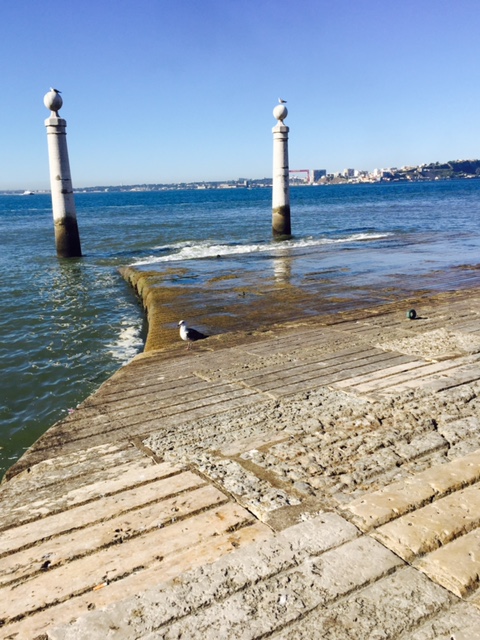the gift of Portugal
la mar
Mother of Life
la madre
oh Mary where
among the saints
does the sea
have her name
engraved
Having slept on three planes so far, after 20 hours of travel I arrived rumpled and excited in Lisbon at 6:00am local time. The sound of my passport being stamped for the first time echoed in my ears as I exited the airport – and found myself officially in Europe.
I got a real coffee. Thick foam, lovely brown, hearty and satisfying like a crusty loaf of homemade bread. The tiny white cup and delicate silver spoon let me savor my first moment away, relaxing at my cafe table like a movie extra, anonymous behind the story.
I caught the aerobus, which looped from the airport past hotels and restaurants and into the center of the old city. The streets were cobbled, the plazas actually mosaic, as were some of the walkways. I turned in circles occasionally, wondering at the world beneath my feet. Stone steps led from the main square surrounded on three sides by the palatial buildings of the kings of Portugal, down to the harbor – literally, down into the harbor, with iron rings pinned into the stone steps that disappeared into a blue-green bay. Gulls landed nearby, as pigeons hunted for crumbs. Out beyond the last steps, two stone pillars rose from the water. Sitting with my bare feet just touching the lapping water, I realized that this was the original entrance to Lisbon – by boat, of course. What a spectacular front gate. A man played Fado-style guitar as tourists took pictures, summer skirts and sun hats ruffling in a cool summer breeze. People sat reading on the seats built into the low stone balustrade winding away along the harbor shore. With hours before I needed to catch the bus back to the airport, I let myself be lulled by the music, the sun, the breeze through palm trees, couples walking past holding hands, boats in the harbor.
Fado is the richly blended music of Portugal: sad, filled with longing, wistful maybe’s and what if’s and the melancholy regret of a passionate love forever lost. I could feel it deeply, this waiting for a boat that never came back, a voice that never called my name again, a burning heart grown cold for reasons never known. But instead of some other, the lost beloved was me.
I wondered if I was too late. This fear, more than any other, I had carried across the Atlantic like the burden stone in my backpack. The stone I would give up on the Camino; but this burden of fear, of time forever lost, weighed heavy. I listened to the seagulls crying to each other, their voices blending with the Fado guitar, the creaking of a nearby dock accompanying them. I could hear the beginning of a song to it all, and just sat on the steps of Lisbon’s harbor, listening to the aching harmonies that can hardly bear what we ask. Steps that lead down deeper than we know.
* * * * * * * * * * * * * * * * *
“Your ticket – where is the other part?”
“There was no other part – only this.”
“Where?”
“From the machine. At the airport.”
The aerobus driver shook his head. A passenger with stronger English explained tickets come in two parts. The second missing part had a code I needed. When he understood I had only come from the airport, seen the water, and now returned to the airport, the driver waved me back to a seat.
The passenger told me, “Always get both pieces,” and smiled, and for a moment I imagined that I became a local in Lisbon, using the airport bus to go to the old city, the Praca do Comercio and the beautiful fountains with green figures on four sides, the colorfully painted plaster buildings of yellow, pink, blue, and the tiled buildings at their sides – entire facades covered in intricately designed four-by-four tiles. Color and tiles, and red clay tile roofs, and ornate iron balconies, all gleaming under the midday sun.
The narrow streets of Lisbon flow down and around its hills, intersecting at random, organic, no right angles. It is easy to lose your way. If you fight to find a direct path, you wind up going in circles. So I had finally let go and just wandered, slowly, in gentle arcs. A young mother sat a moment at her open upstairs window, her baby craning his neck to see me, laundry fluttering on the wall between us. The Santa Maria Maior Cathedral rose like a fortress of belief in the midst of wonder. Shopkeepers smiled in their doorways and chatted across the streets to each other. Workers hung colored streamers and set up tables for the next fiesta, called a festa here.
Drifting between being a local and a tourist, I was already remembering as I saw through the bus window the Avenida da Liberdade and the Marques de Pombal, shady promenades under huge trees I’ve never known before, something like a cross of maple and catalpa leaves, with trunks seemingly blown smooth by the winds off the sea. They look like the tallest giraffes, smooth and pale with patches of khaki and brown, grown to trees instead of animals. Utterly foreign to me.
Eucalyptus, I found out. Their shade cooled the sidewalks, and the road, and the bus back to the airport as I returned for the flight to Spain, soothed and welcomed regrets-and-all through the Fado gates into coracao de Lisboa, the heart of Lisbon. Having washed my pilgrim feet by stepping into the ocean to which I would return.
